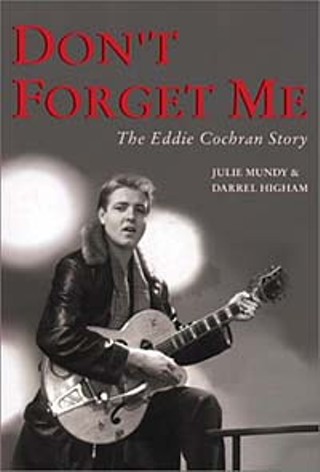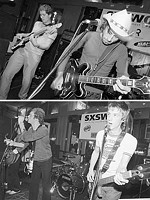Twenty Flight Rock
The Summer Rock Roundup
By Jerry Renshaw, Fri., July 20, 2001

Don't Forget Me
The Eddie Cochran Storyby Julie Mundy and Darrel Higham

Billboard Books, 224 pp., $18.95 (paper)
When Eddie Cochran died in an auto accident in 1960 in England, he had never received his due in his native country. Though "Summertime Blues" and "Twenty Flight Rock" were radio hits, Cochran hardly achieved the status of Elvis or Buddy Holly in his short career. Still, he left behind some of the hardest-rocking and most influential records of the Fifties; Mundy and Higham's book Don't Forget Me: The Eddie Cochran Story chronicles his career in exhaustive detail.
Included are details of his early days on guitar -- by age l5, Cochran could play Merle Travis' and Chet Atkins' elaborate fingerstyle songs as well as Joe Maphis' flatpicking technique. Unlike many other players of the early rock years, Cochran was an accomplished guitarist who elected to play a more primitive and raw style. Guitarists should appreciate the discussion of how Cochran came to play the orange Gretsch 6120 Chet Atkins model; much like today, a high-dollar guitar was very much a status symbol for up-and-coming young players.
It may come as a surprise to casual fans to know that Eddie Cochran flirted with straight country and honky-tonk; he and Hank Cochran (no relation) performed as the Cochran Brothers and put out some very spirited country-flavored rockabilly ("Tired 'n' Sleepy," "Slow Down") before their label folded. Eddie's looks made him a natural for the screen, and he appeared in Frank Tashlin's classic Fifties farce The Girl Can't Help It along with Little Richard, Gene Vincent, and assorted others, and Untamed Youth with Mamie Van Doren in '57. One thing that's clear from the path of Cochran's U.S. career is that he was never a rockabilly cat in the mold of Carl Perkins; songs like "Somethin' Else" and "C'mon Everybody" were muscular rock & roll powerhouses that owed little to rockabilly's country-blues lineage.
By the late Fifties, Elvis was in the Army and many of the early rockers were being pushed to one side by pop pretty boys like Frankie Avalon and Fabian. The rock purists were in the UK, and that's where Cochran wound up, spawning a spate of pallid, pompadoured Brit imitators with ridiculous names like Vince Eager, Billy Fury, and Dickie Power. Along with the greasy Gene Vincent and other Yanks, Cochran played to packed houses and occasional riots in the British Isles up until his death. Mundy and Higham's book is laden with quotes from friends and contemporaries of Cochran, but its prosy style reads like a recitation of the facts while giving little insight into Cochran's personality and nature. In most ways he seemed to be an all-American kid (except for a slight gun fetish), not especially prone to drink or drugs like his thuggish pal Vincent ... but that's about as far as the book goes.
What few clues there are as to Cochran the man are tantalizing (along with some great and rare pictures), but unfortunately don't go into much depth. Still, rock fans and Fifties fanatics would do well to give Don't Forget Me a quick read for an appreciation of one of rock's most talented and influential early stars and a rather sad contemplation of what might have been.








